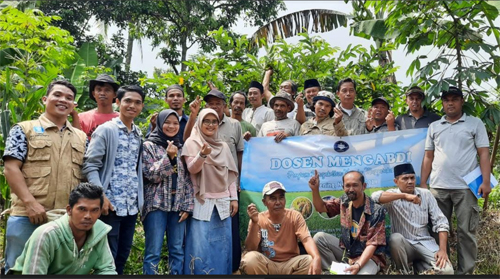Lecturer Serving IPB University Helps Guava Farmers Overcome Pests

Fitrianingrum Kurniawati, SP, MSi, Serving Lecturer from the Plant Protection Department, Faculty of Agriculture (Faperta) IPB University teaches guava farmers about the strategy of controlling guava pests. Fitri explained “Introduction of Plant Disturbing Organisms (OPT) on Guava Plants and Environmental-Based Control Strategies” in Cibening Village, Pamijahan District, Bogor Regency, West Java, (29/11).
Fitri is a lecturer participant who serves, one of the programs held by the Institute for Research and Community Service (LPPM) IPB University. The lecturer who serves at Pamijahan aims to provide information on how to solve problems faced by guava farmers in accordance with the expectations of all farmers.
In this activity, the IPB University nematode expert introduced pests and diseases that attack guava plants and environmentally friendly controls. In addition, Fitrianingrum also displays a video that contains how nematodes cause disease in plants and the symptoms they cause. This video is also to explain to farmers who are still laymen about nematodes. “Based on observations of pests and diseases in guava gardens, Helopeltis ladybugs were found and the disease found was Meloidogyne root puru nematode on guava with symptoms in the form of root nodules on guava roots,” he said.
This activity was attended by around 30 guava farmers who were very enthusiastic and felt someone was paying attention again. During this time they are confused about having to ask or convey where their sick plants are and how to cultivate guava plants properly.
Hisnu, the farmer representative expressed his gratitude and expressed his hope that this program can continue until the farmers are independent and able to manage Plant Disease Pests (HPT) on the plants they plant.
For this reason, this activity does not stop here. On 8 December 2019 there will still be action research activities. This action research includes the creation of PGPR (Plant Growth Promoting Rhizobacteria) from Imperata and bamboo roots as an effort to make plants healthy. It will also plant tagetes around the guava plantations in an effort to control plant parasitic nematodes.
Fitrianingrum hopes that this activity will benefit farmers, especially guava farmers, because farmers gain knowledge about pest and guava diseases. In addition, farmers also gain knowledge about the application of IPM on guava pests and diseases so that they are able to control pests and diseases correctly and on target. (AVR)
Keyword: Dedicated Lecturer, LPPM IPB University, Cibening Village, Plant Disturbance Organization, Guava



